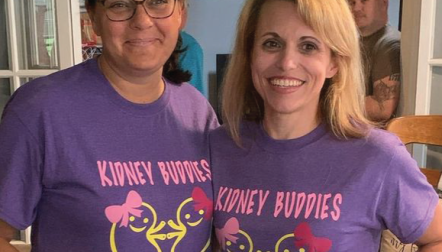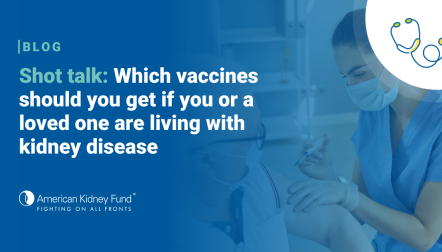
Blog post
Kidney-friendly eating during the coronavirus health emergency

As we adjust to the new normal of shutdowns and closures during the coronavirus (COVID-19) crisis, many people with kidney disease are wondering how they can safely stick to the food and fluid recommendations their doctors and dietitians have set for them. Here are some tips for grocery shopping and ordering restaurant delivery while you are social distancing.
Grocery shopping
If you do not have a friend or family member who can go grocery shopping for you, some chain and local grocery stores are offering specialty hours just for elderly or immunocompromised people, allowing for less crowds and faster visits. Check with your local stores to see which ones may be offering these hours.
If you are grocery shopping for yourself, remember to stay six feet away from others inside the store; do not touch your hands to your face; and wash your hands with soap and water for 20 seconds as soon as you get home.
Another option is to call your local grocery store to see if they offer delivery. Many stores that normally do not deliver are making special arrangements to help keep people safe during this health emergency. For larger chains that always offer delivery, you can shop online and schedule a delivery time on their website or mobile app. Keep in mind that you may need to schedule delivery several days or more in advance because so many people are currently using these services.
You can also get delivery from third-party sources, like Amazon Prime, Instacart, Shipt, FreshDirect, Peapod and more, though some of these have delivery fees. Keep in mind that many items may be in short supply right now and it may take longer than normal to get a delivery. Plan to place your grocery orders enough in advance to make sure you do not run out of kidney-friendly foods and essentials.
Some of these delivery services, like Amazon Prime, always leave food orders outside your front door rather than coming into your home. You can let other services and grocery stores know that you are at high risk for COVID-19 and need the driver to leave your order outside for you to pick up once they have left.
Regardless of how you get your food and supplies in, it is a good idea to wipe down items using disinfectant wipes if you have them available. If you do not have disinfectant wipes available, this article gives tips on how to safely clean items in your home.
AKF's kidney-friendly eating website, Kidney Kitchen®, has a sample grocery shopping list you can use to help you stock your pantry, freezer and refrigerator with healthy options. Now is also a great time to experiment with some of the more than 700 kidney-friendly recipes on Kidney Kitchen! Remember to wash your hands with soap and water for 20 seconds before preparing and eating any foods.
If you are on dialysis, it is extremely important to keep up with your regular treatment schedule, even during the crisis, to avoid having harmful toxins build up in your body. Missing just one dialysis appointment can cause serious health problems, which can put you at even higher risk for COVID-19. If you must miss dialysis for any reason, be sure to have the foods and drinks in the 3-day emergency kidney diet on hand to help you stay as healthy as possible between treatments.
Ordering restaurant delivery
If you are ordering from a restaurant, try to stick with places that you already know can accommodate your special dietary needs. Many restaurants that do not normally offer delivery are doing so temporarily during this crisis. You can reach out to them directly or try a food delivery app, like Uber Eats, Postmates, GrubHub, DoorDash, Caviar and more, keeping in mind that some of these charge a delivery fee. If you have questions about the ingredients in foods from restaurants you have never ordered from before, be sure to call the restaurant and ask about them before you place your order.
Many delivery apps have added a "no-contact" delivery option specifically for coronavirus, which means you will not have direct contact with the delivery person. Selecting this option lets the delivery person know to leave the food outside your front door. If the app does not have a no-contact option, you can write that in as a special request in most apps' checkout process. If you are ordering directly from a restaurant, you can let them know over the phone that you are high-risk and ask them to leave the food outside your front door.
Once you receive your food delivery, put the food you plan to eat right away on one of your own dishes and throw away the packaging it came in. Coronavirus can live on cardboard for up to 24 hours and on plastic for up to three days, so you should not eat directly out of any takeout containers. If you plan to save some of your order for later, put the food into one of your own reusable containers so you do not keep the packaging in your refrigerator. Remember to wash your hands with soap and water for 20 seconds after touching any takeout containers and before eating.
You can find more information and resources for people living with kidney disease by visiting our coronavirus webpage. AKF will update the page with important information for people living with kidney disease and their caregivers as the coronavirus crisis continues to unfold.



